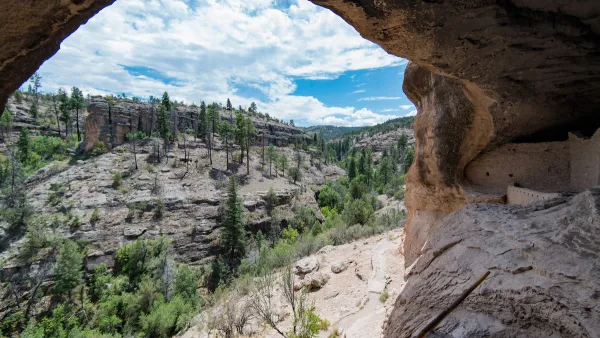Environmental groups are split over legislation that would remove the nationwide ban on bicycles in the wild.

A proposal, from national nonprofit Sustainable Trails Coalition, would allow other federal agencies to decide whether to apply language in the U.S. Wilderness Act banning "mechanical transport" to bikes on a case-by-case basis.
Since bikes are currently banned on 106 million acres of federal wilderness land in the United States, that flexibility could make a big dent.
Local conservation groups in Oregon have opposed the proposal—some for reasons more philosophical than ecological. In an article by Jamie Hale for The Oregonian, activists say they're protecting a perceived ethos of nature; one spokesperson cites values of "humility" and "restraint," claiming that bikes don't "belong" in nature.
A more pragmatic approach comes up in the comments, where locals argue that the velocity and volume of mountain bikes amplifies their impact on trails.
But if a philosophy of the wilderness remains at issue, it’s worth noting that an attitude that sees only organic access to nature as legitimate can also impact people who use strollers, wheelchairs, and other tools that, while allowed on trails, still face barriers to accommodation there.
Congress has not yet acted on the proposal. If it were to pass, agencies would determine how to approach the issue, and could impose their own restrictions on bikes.
FULL STORY: Do mountain bikes belong in the wild? Battle brewing over bike access to federal land

National Parks Layoffs Will Cause Communities to Lose Billions
Thousands of essential park workers were laid off this week, just before the busy spring break season.

Retro-silient?: America’s First “Eco-burb,” The Woodlands Turns 50
A master-planned community north of Houston offers lessons on green infrastructure and resilient design, but falls short of its founder’s lofty affordability and walkability goals.

Delivering for America Plan Will Downgrade Mail Service in at Least 49.5 Percent of Zip Codes
Republican and Democrat lawmakers criticize the plan for its disproportionate negative impact on rural communities.

Test News Post 1
This is a summary

Test News Headline 46
Test for the image on the front page.

Balancing Bombs and Butterflies: How the National Guard Protects a Rare Species
The National Guard at Fort Indiantown Gap uses GIS technology and land management strategies to balance military training with conservation efforts, ensuring the survival of the rare eastern regal fritillary butterfly.
Urban Design for Planners 1: Software Tools
This six-course series explores essential urban design concepts using open source software and equips planners with the tools they need to participate fully in the urban design process.
Planning for Universal Design
Learn the tools for implementing Universal Design in planning regulations.
EMC Planning Group, Inc.
Planetizen
Planetizen
Mpact (formerly Rail~Volution)
Great Falls Development Authority, Inc.
HUDs Office of Policy Development and Research
NYU Wagner Graduate School of Public Service




























